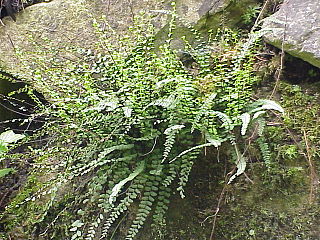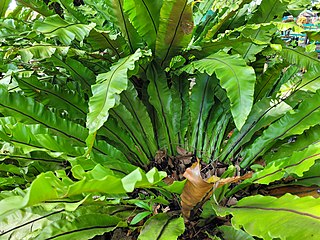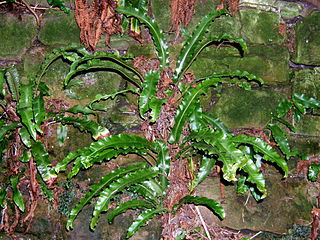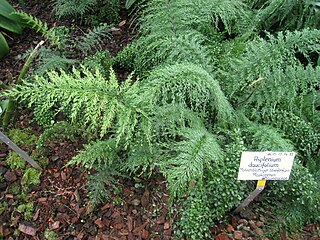
Asplenium is a genus of about 700 species of ferns, often treated as the only genus in the family Aspleniaceae, though other authors consider Hymenasplenium separate, based on molecular phylogenetic analysis of DNA sequences, a different chromosome count, and structural differences in the rhizomes. The type species for the genus is Asplenium marinum.

Asplenium nidus is an epiphytic species of fern in the family Aspleniaceae, native to tropical southeastern Asia, eastern Australia, Hawaii, Polynesia, Christmas Island, India, and eastern Africa. It is known by the common names bird's-nest fern or simply nest fern.

Asplenium scolopendrium, commonly known as the hart's-tongue fern, is an evergreen fern in the family Aspleniaceae native to the Northern Hemisphere.

Asplenium ceterach, also known as the rustyback fern, is a fern species in the spleenwort family Aspleniaceae.

Asplenium septentrionale is a species of fern known by the common names northern spleenwort and forked spleenwort. It is native to Europe, Asia and western North America, where it grows on rocks. Its long, slender leaves give it a distinctive appearance. Three subspecies exist, corresponding to a tetraploid and a diploid cytotype and their triploid hybrid.

Asplenium vespertinum is a species of fern known by the common name western spleenwort. It is native to southern California and Baja California, where it grows in moist, shady, rocky places, such as the shadows beneath cliff overhangs.

Asplenium flaccidum is a species of fern in the family Aspleniaceae. The plant common name is drooping spleenwort or weeping spleenwort, and the species name flaccidum derives from the Latin root meaning drooping. An example occurrence of A. flaccidum is within a Nothofagus-Podocarp forest at Hamilton Ecological District on New Zealand's North Island in association with other fern species understory plants, crown fern, Blechnum discolor being an example.

Asplenium ruta-muraria is a species of fern commonly known as wall-rue. It is a very small epipetric species, growing exclusively on limestone and other calcareous rocks. Its fronds are bluish-green and are heavily sub-divided, becoming up to 12 cm in length.

Asplenium daucifolium is a species of fern in the family Aspleniaceae, endemic to the Mascarene Islands.

Asplenium dimorphum, the Norfolk Island spleenwort, is a species of fern in the family Aspleniaceae, endemic to Norfolk Island.

Asplenium anceps is a diploid fern of family Aspleniaceae and one of the ancestors of the ferns that form the trichomanes complex. It lives exclusively in the three northernmost archipelagoes of the Macaronesian region, that is, is an endemic macaronesian fern. Its fronds are leathery and plastic and rachis is very thick, bright reddish brown and is traversed throughout its length of three wings, two on the upper surface to draw a groove and a third on the lower surface which is characteristic and unique to this species, since all other species of the trichomanes complex without. A typical feature of this fern, which he shares with all its hybrid offspring is the existence of a small atrium on the basis of medium and less pinnae directed toward the apex of the blade with one or two sori on its underside.

Asplenium viride is a species of fern known as the green spleenwort because of its green stipes and rachides. This feature easily distinguishes it from the very similar-looking maidenhair spleenwort, Asplenium trichomanes.

Asplenium adiantum-nigrum is a common species of fern known by the common name black spleenwort. It is found mostly in Africa, Europe, and Eurasia, but is also native to a few locales in Mexico and the United States.

Asplenium milnei is a ground fern only found on Lord Howe Island. Commonly seen in lowland areas.

Asplenium pteridoides is a species of terrestrial fern in the family Aspleniaceae. It is endemic to Australia's subtropical Lord Howe Island in the Tasman Sea. It is restricted to the cool, moist understorey of the forest on the island's southern mountains.

Asplenium surrogatum is a species of fern in the family Aspleniaceae. It is endemic to Australia's subtropical Lord Howe Island in the Tasman Sea. It grows both terrestrially and as an epiphyte. It occurs in forest at high elevations on the island's mountains.

Asplenium difforme is a plant in the spleenwort group of ferns. Its habitat is cracks in rocky headlands beside the sea. It is found in eastern Australia and Norfolk Island. Its fronds are thick and waxy to protect it from sea spray.
Asplenium haughtonii, also known as the Barn fern, is a species of fern in the family Aspleniaceae. It is native to Saint Helena.
Asplenium dielfalcatum is a species of fern in the family Aspleniaceae. It is native to Oahu, Hawaii.
Asplenium unisorum, the singlesorus island spleenwort, is a species of fern endemic to the Hawaiian Islands.


















